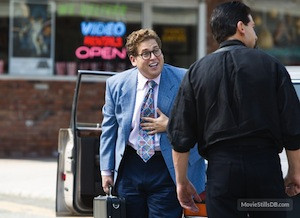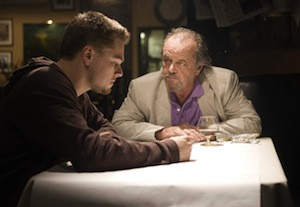Over the weekend, I revisited Martin Scorsese’s The Wolf of Wall Street, and it struck me again just how captivating, and yes, slightly overindulgent, it is. The film’s blend of dark humor, fast-paced narrative, and outrageous true story creates a unique cinematic experience that leaves you wanting more – or perhaps something similar, but maybe a tad shorter. While Casino, another Scorsese epic, justifies its length with a relentlessly gripping narrative, The Wolf of Wall Street occasionally feels like it luxuriates a bit too much in its excesses, particularly in scenes featuring Jonah Hill’s character.
Hill, an undeniably talented and energetic comedic force, seems to have been given ample room to improvise, a directorial indulgence that, while often funny, sometimes disrupts the film’s momentum. Take, for example, the scene where his character, Donnie Azoff, delivers a suitcase of cash. It stretches on, showcasing Hill’s improvisational tirades, which, while amusing, could have been just as effective, if not more so, with tighter editing. This observation sparked a thought about improvisation in film, its evolving role, and its impact, especially in movies aiming for a similar high-energy, darkly comedic tone as The Wolf of Wall Street.
 Jonah Hill and Jon Bernthal in The Wolf of Wall Street
Jonah Hill and Jon Bernthal in The Wolf of Wall Street
Jonah Hill’s energetic performance as Donnie Azoff, captured in a scene from “The Wolf of Wall Street,” exemplifies the improvisational and comedic elements that define movies in this genre.
Improvisation has a long history in cinema, dating back to the silent era. Directors have always valued actors capable of spontaneous creativity. Sigourney Weaver, in an Esquire interview about Ghostbusters, noted Bill Murray’s expectation to improvise constantly. However, early filmmaking, constrained by film stock costs and setup times, meant improvisation was often refined off-camera before being filmed. Actors would develop unscripted material in private or rehearsals, resulting in polished improvisations in the final cut. The digital revolution, with affordable digital cameras and directors like Judd Apatow embracing actor interplay in real-time, changed this. Cheap digital tape allowed for extensive takes, capturing spontaneous moments that, when expertly edited, could be cinematic gold. This approach, emphasizing improvisation and naturalistic performance, has influenced films even shot on traditional film, like The Wolf of Wall Street.
 Leonardo DiCaprio and Jack Nicholson in The Departed
Leonardo DiCaprio and Jack Nicholson in The Departed
Leonardo DiCaprio and Jack Nicholson in “The Departed,” a Scorsese film that, like “The Wolf of Wall Street,” blends crime elements with dark humor, showcasing how directors use improvisation to enhance character portrayals.
However, the reliance on improvisation, especially in comedies, can become predictable. Apatow’s post-Funny People movies have seen diminishing returns, highlighting a crucial point: improvisation needs to serve character and narrative. Hilarious moments are fleeting if they don’t contribute to our understanding of the characters. Otherwise, it feels like actors are merely filling time, prioritizing laughs over story development. Jonah Hill’s improvisations in The Wolf of Wall Street, while funny, often feel like variations of his established comedic persona. While hints of his character’s eccentric personal life appear early on, they are largely unexplored, leaving his character somewhat underdeveloped. Many of his key scenes involve repetitive comedic beats, making one wish for tighter editing to retain the best moments and trim the excess.
Scorsese himself is no stranger to masterful improvisation, think of “You talkin’ to me?” from Taxi Driver or “I’m a clown? I amuse you?” from Goodfellas. These iconic lines arose from improvisation and deepened our understanding of the characters. In contrast, The Wolf of Wall Street sometimes uses improvisation merely to showcase Jonah Hill’s comedic profanity. This isn’t a criticism of Hill, who performs admirably with what he’s given, but rather of a directorial approach that occasionally prioritizes scene length over narrative efficiency. The Departed offers a similar example with Jack Nicholson’s unrestrained performance, yet in that film, the improvisation, however excessive, adds to a well-developed character. Improvisation has its place, especially in contemporary comedy, where rapid-fire laughs are often expected. However, The Wolf of Wall Street serves as a cautionary tale about the pitfalls of excess, reminding us that even in high-energy crime comedies, focused storytelling and character development remain paramount.
If you enjoyed the exhilarating, darkly comedic, and often outrageous ride of The Wolf of Wall Street, here are a few movies that capture similar vibes, balancing crime, comedy, and high-octane energy:
- Goodfellas (1990): Another Scorsese masterpiece, Goodfellas offers a similarly fast-paced and darkly humorous look at the criminal underworld, focusing on the rise and fall of mobster Henry Hill. Its iconic narration and dynamic performances are hallmarks of the genre.
- Casino (1995): Also directed by Scorsese and starring Robert De Niro and Joe Pesci, Casino delves into the world of Las Vegas casinos and organized crime with operatic scope and intensity. While perhaps less comedic than The Wolf of Wall Street, it shares the same themes of excess, greed, and betrayal.
- The Big Short (2015): This Adam McKay film tackles the 2008 financial crisis with a darkly comedic and accessible approach, much like The Wolf of Wall Street portrays the excesses of Wall Street. It features a star-studded cast and a fast-paced, informative narrative.
- American Psycho (2000): While leaning more into psychological thriller territory, American Psycho shares The Wolf of Wall Street‘s dark humor and exploration of excess and materialism in the world of high finance. Christian Bale’s iconic performance is a must-see.
- War Dogs (2016): Starring Jonah Hill, this film tells the true story of two arms dealers who land a lucrative Pentagon contract. It captures a similar blend of dark comedy and crime, with Hill once again delivering a memorable performance in a morally ambiguous role.
These movies, like The Wolf of Wall Street, offer a thrilling blend of crime and comedy, exploring themes of ambition, greed, and the intoxicating allure of excess. They provide a similar cinematic rush, albeit hopefully in a slightly less lengthy package.


